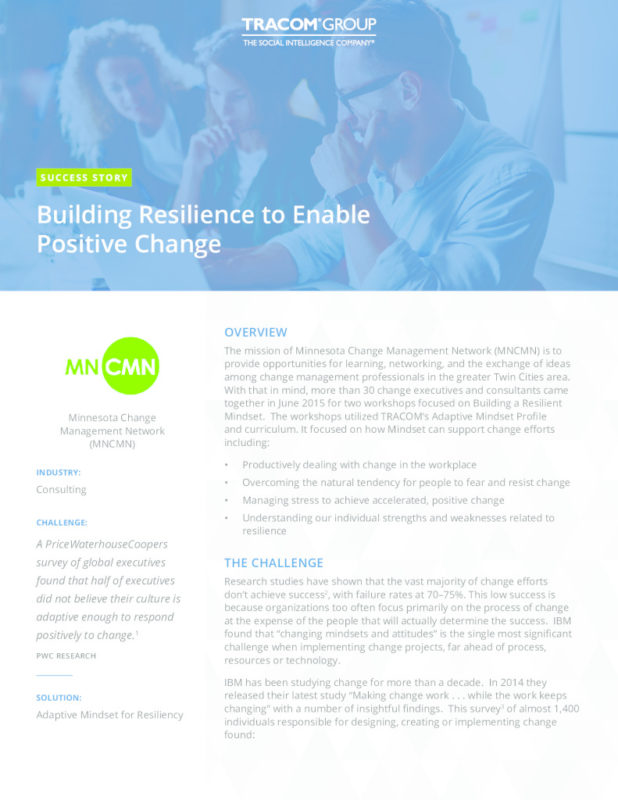Research studies have shown that the vast majority of change efforts don’t achieve success, with failure rates at 70–75%. This low success is because organizations too often focus primarily on the process of change at the expense of the people that will actually determine the success. IBM found that “changing mindsets and attitudes” is the single most significant challenge when implementing change projects, far ahead of process, resources or technology. See how positive changes affect organizations and could help yours too.
Minnesota Change Management Network
The Minnesota Change Management Network (MNCMN) is dedicated to facilitating learning, networking, and the exchange of ideas among change management professionals in the greater Twin Cities area. In June 2015, MNCMN organized two workshops with a focus on “Building a Resilient Mindset,” which drew participation from over 30 change executives and consultants. These workshops were designed to harness the power of mindset in supporting change efforts within organizations. They utilized TRACOM’s Adaptive Mindset Profile and curriculum, emphasizing key aspects like effectively dealing with workplace change, overcoming innate resistance to change, managing stress for accelerated positive transformation, and gaining insights into individual strengths and weaknesses related to resilience.
Change Versus Successful Change
The challenge of achieving successful change initiatives in organizations has long been recognized, with research indicating a high failure rate of approximately 70-75%. Organizations often prioritize the process of change over addressing the human elements that are instrumental in determining success. IBM’s extensive studies on change management have revealed that “changing mindsets and attitudes” represents the most significant challenge in change projects, far surpassing concerns related to process, resources, or technology. A 2014 IBM study underscored the need for a shift in focus, indicating that just 20% of respondents were deemed successful in managing change, while 87% believed that change management was insufficiently emphasized in critical projects. Moreover, only 40% believed they possessed the requisite skills to manage change effectively, and just 49% of organizations held their leaders accountable for change management. Change professionals, like those associated with MNCMN, are at the forefront of addressing this challenge and advocating for a more holistic approach that takes into account people’s natural tendencies in response to change.
Workshops and Results
The MNCMN workshops, featuring participants from leading Minnesota-based Fortune 500 companies and independent change consultants, provided valuable tools for achieving positive changes within organizations. These workshops, led by certified instructors from The TRACOM Group, a prominent provider of Social Intelligence assessments and training, offered a fresh perspective on managing change through building a resilient mindset. As organizations face increasing change driven by technology and globalization, the commitment to turning change into a competitive advantage is evident. MNCMN’s Executive Director, Sara Lykken, acknowledges this trend, highlighting the importance of providing change professionals with the necessary tools and strategies to navigate both negative and positive changes effectively. This initiative underscores the critical role played by organizations like MNCMN in shaping the future of change management.

 New Horizons
New Horizons
 Project Management Academy
Project Management Academy
 Six Sigma Online
Six Sigma Online
 TCM Security
TCM Security
 TRACOM
TRACOM
 Velopi
Velopi
 Watermark Learning
Watermark Learning
 Login
Login

